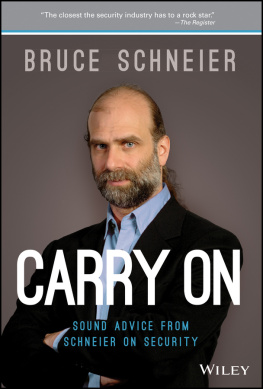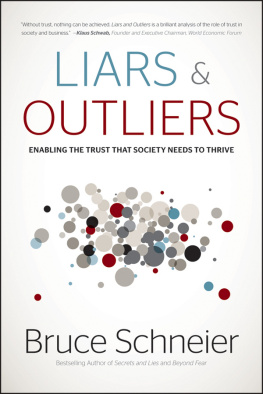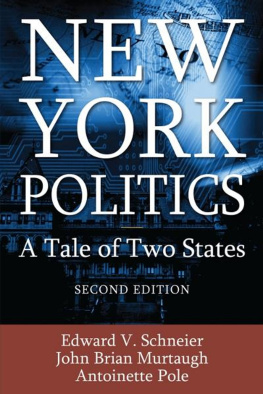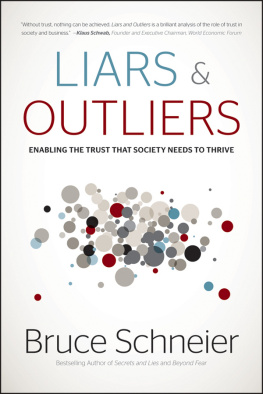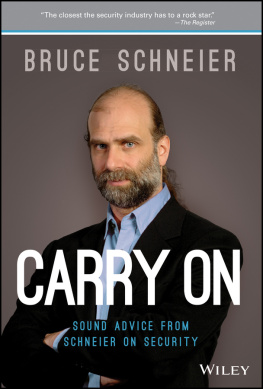Contents
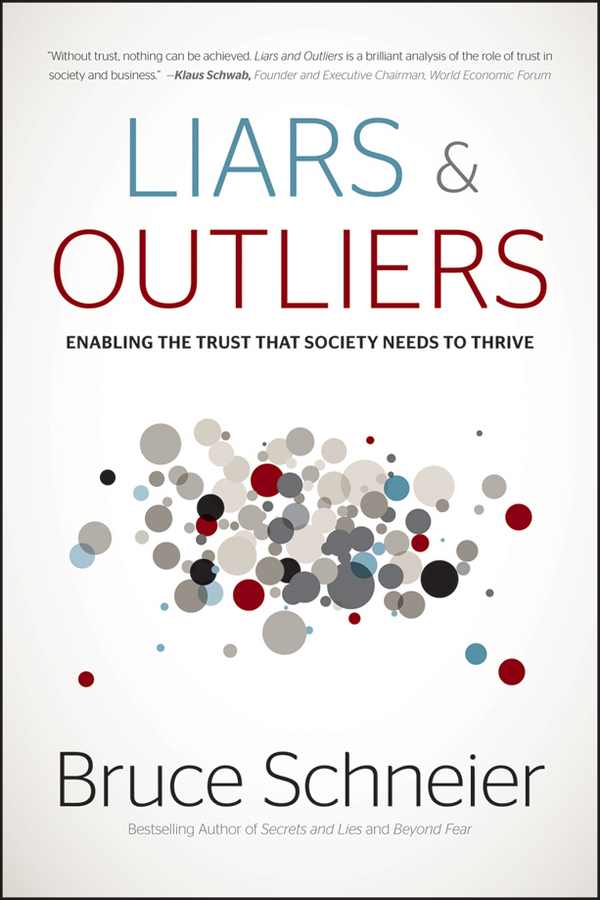
A Note for Readers
This book contains both notes and references. The notes are explanatory bits that didn't make it into the main text. These are indicated by superscript numbers in both the paper and e-book formats. The references are indicated by links in the main text.
High-resolution versions of the figures can be found at www.schneier.com/lo .
Chapter 1
Overview
Just today, a stranger came to my door claiming he was here to unclog a bathroom drain. I let him into my house without verifying his identity, and not only did he repair the drain, he also took off his shoes so he wouldn't track mud on my floors. When he was done, I gave him a piece of paper that asked my bank to give him some money. He accepted it without a second glance. At no point did he attempt to take my possessions, and at no point did I attempt the same of him. In fact, neither of us worried that the other would. My wife was also home, but it never occurred to me that he was a sexual rival and I should therefore kill him.
Also today, I passed several strangers on the street without any of them attacking me. I bought food from a grocery store, not at all concerned that it might be unfit for human consumption. I locked my front door, but didn't spare a moment's worry at how easy it would be for someone to smash my window in. Even people driving cars, large murderous instruments that could crush me like a bug, didn't scare me.
Most amazingly, this worked without much overt security. I don't carry a gun for self-defense, nor do I wear body armor. I don't use a home burglar alarm. I don't test my food for poison. I don't even engage in conspicuous displays of physical prowess to intimidate other people I encounter.
It's what we call trust. Actually, it's what we call civilization.
All complex ecosystems, whether they are biological ecosystems like the human body, natural ecosystems like a rain forest, social ecosystems like an open-air market, or socio-technical ecosystems like the global financial system or the Internet, are deeply interlinked. Individual units within those ecosystems are interdependent, each doing its part and relying on the other units to do their parts as well. This is neither rare nor difficult, and complex ecosystems abound.
At the same time, all complex ecosystems . Within every interdependent system, there are individuals who try to subvert the system to their own ends. These could be tapeworms in our digestive tracts, thieves in a bazaar, robbers disguised as plumbers, spammers on the Internet, or companies that move their profits offshore to evade taxes.
Within complex systems, there is a fundamental tension between what I'm going to call cooperating, or acting in the group interest; and what I'll call defecting, or acting against the group interest and instead in one's own self-interest. Political philosophers have recognized this antinomy since Plato. We might individually want each other's stuff, but we're collectively better off if everyone respects property rights and no one steals. We might individually want to reap the benefits of government without having to pay for them, but we're collectively better off if everyone pays taxes. Every country might want to be able to do whatever it wants, but the world is better off with international agreements, treaties, and organizations. In general, we're collectively better off if society limits individual behavior, and we'd each be better off if those limits didn't apply to us individually. That doesn't work, of course, and most of us recognize this. Most of the time, we realize that it is in our self-interest to act in the group interest. But because parasites will always existbecause some of us steal, don't pay our taxes, ignore international agreements, or ignore limits on our behaviorwe also need security.
Society runs on trust. We all need to trust that the random people we interact with will cooperate. Not trust completely, not trust blindly, but be reasonably sure (whatever that means) that our trust is well-founded and they will be trustworthy in return (whatever that means). This is vital. If the number of parasites gets too large, if too many people steal or too many people don't pay their taxes, society no longer works. It doesn't work both because there is so much theft that people can't be secure in their property, and because even the honest become suspicious of everyone else. More importantly, it doesn't work because the social contract breaks down: society is no longer seen as providing the required benefits. Trust is largely habit, and when there's not enough trust to be had, people stop trusting each other.
The devil is in the details. In all societies, for example, there are instances where property is legitimately taken from one person and given to another: taxes, fines, fees, confiscation of contraband, theft by a legitimate but despised ruler, etc. And a societal norm like everyone pays his or her taxes is distinct from any discussion about what sort of tax code is fair. But while we might disagree about the extent of the norms we subject ourselves tothat's what politics is all aboutwe're collectively better off if we all follow them.
Of course, it's actually more complicated than that. A person might decide to break the norms, not for selfish parasitical reasons, but because his moral compass tells him to. He might help escaped slaves flee into Canada because slavery is wrong. He might refuse to pay taxes because he disagrees with what his government is spending his money on. He might help laboratory animals escape because he believes animal testing is wrong. He might shoot a doctor who performs abortions because he believes abortion is wrong. And so on.
Sometimes we decide a norm breaker did the right thing. Sometimes we decide that he did the wrong thing. Sometimes there's consensus, and sometimes we disagree. And sometimes those who dare to defy the group norm become catalysts for social change. Norm breakers rioted against the police raids of the Stonewall Inn in New York in 1969, at the beginning of the gay rights movement. Norm breakers hid and saved the lives of Jews in World War II Europe, organized the Civil Rights bus protests in the American South, and assembled in unlawful protest at Tiananmen Square. When the group norm is later deemed immoral, history may call those who refused to follow it heroes.
In 2008, the U.S. real estate industry collapsed, almost taking the global economy with it. The causes of the disaster are complex, but were in a large part caused by financial institutions and their employees subverting financial systems to their own ends. They wrote mortgages to homeowners who couldn't afford them, and then repackaged and resold those mortgages in ways that intentionally hid real risk. Financial analysts, who made money rating these bonds, gave them high ratings to ensure repeat rating business.
This is an example of a failure of trust: a limited number of people were able to use the global financial system for their own personal gain. That sort of thing isn't supposed to happen. But it did happen. And it will happen again if society doesn't get better at both trust and security.
Failures in trust have become global problems:
- The Internet brings amazing benefits to those who have access to it, but it also brings with it new forms of fraud. Impersonation fraudnow called identity theftis both easier and more profitable than it was pre-Internet. Spam continues to undermine the usability of e-mail. Social networking sites deliberately make it hard for people to effectively manage . And antagonistic behavior threatens almost every Internet community.

